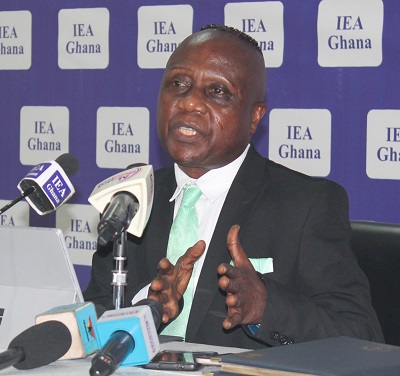The Institute of Economic Affairs (IEA) is cautioning the government against the introduction of new or higher taxes in the 2024 Budget, saying the introduction or increasing of taxes is not the answer to the country’s problems.
In its State of Ghana’s Economy and Expectations of the 2024 Budget, the IEA said the solution rather lies in innovations in tax policy, plugging loopholes in the tax system and the strengthening of tax administration, among others.
“New taxes or higher rates for existing taxes are really not the answer since the limited number of taxpayers are already overburdened. The solution lies in innovations in tax policy, plugging loopholes in the tax system and strengthening tax administration, among others. Specifically, we want the 2024 budget to focus on the following areas”.
In streamlining the tax system, the IEA wants the reinforcement of tax compliance, including through the use of technology for assessments and payments and check tax fraud and corruption through the use of technology and enhanced surveillance methods.
It also advocated the rationalisation of import duties to promote imports through ports and boost associated taxes, while easing the tax burden on importers that find its way into local prices of imports and abolish taxes generally regarded as of nuisance-value, outdated, multiple or posing health risks, such as E-levy and Covid-19 levy.
On the rationalisation of expenditure, the IEA said there is room to rationalize/streamline expenditure, reduce waste and increase efficiency.
“Both economic-classified expenditure, that is recurrent and capital expenditure, and sectoral-classified expenditure need to be rationalized/streamlined to achieve appropriate balances and optimum outcomes”, it stressed.
It further said that the recurrent expenditure has always been the elephant in the room, consuming most of government revenue. This is the result of an oversized public sector, rigid statutory obligations, unauthorized expenditure commitments by Municipal Development Authorities, and wastage in the expenditure management system.
“Government has imposed some expenditure cuts under the ECF, including a cut on executive pay and limits on expenditures by MDAs. Yet, there is still room to further streamline expenditure to avoid waste and improve efficiency. Expenditure on goods and services, including utilities, travel, health care, entertainment and general administration, is a candidate for such streamlining”, it stressed.
It also called for the downsising of government and the Office of the Government Machinery, saying, it is necessary to reduce overall government expenditure.
Government should increase capital expenditure
The IEA also urged the government to increase capital expenditure (CAPEX), saying, it has been continually squeezed to make room for an ever-expanding recurrent expenditure.
“This is inimical to the growth of the economy. It is about time to redress the balance in our budgets. It is suggested to scale up CAPEX to 5-10% of GDP during the ECF period, 2023-26, from the current unacceptably-low level of 3-4% to boost growth. It has to be pointed out, however, that it is not just enough to allocate higher amounts to CAPEX, but it is equally important to pay attention to efficiency in capital spending so as to ensure maximum outcomes”, it pointed out.
Pay more attention to critical sectors of economy
The IEA also called on the government to pay more attention to the productive and critical sectors of the economy.
“Some sectors of the economy are important for supporting growth or providing essential social services. However, these are not given the attention they deserve in terms of resource allocation.
It said agriculture remains the mainstay of the economy, employing over 60% of the labour force. Yet, because of low productivity, food is costly, consuming 44% of Ghanaian’s monthly budget, and food security for all remains a dream.
Meanwhile, the IEA was concerned the budgets did not allocate adequate amounts to agriculture.
With regard to the energy sector, the IEA said it is beset by several challenges, most important is the huge debt in the sector that has been crippling the budget from huge annual payments.
It advised the 2024 Budget to include a plan to address the sector’s debt comprehensively, adding, this should involve a strategy to renegotiate the Public Private Partnership Agreements along with the adoption of a tariff regime that ensures genuine cost recovery along the energy supply-chain.
For education, it said the sector takes a chunk of the country’s budgets, yet facilities are very poor across board.
This it said calls for streamlining of education expenditure adding, the budget must ensure that facilities receive adequate allocation while monitoring should be strengthened to ensure that allocated funds are spent on targeted items.
Latest Stories
-
Paris 2024: Opening ceremony showcases grandiose celebration of French culture and diversity
3 hours -
How decline of Indian vultures led to 500,000 human deaths
4 hours -
Paris 2024: Ghana rocks ‘fabulous fugu’ at olympics opening ceremony
4 hours -
Trust Hospital faces financial strain with rising debt levels – Auditor-General’s report
5 hours -
Electrochem lease: Allocate portions of land to Songor people – Resident demand
5 hours -
82 widows receive financial aid from Chayil Foundation
5 hours -
The silent struggles: Female journalists grapple with Ghana’s high cost of living
5 hours -
BoG yet to make any payment to Service Ghana Auto Group
5 hours -
‘Crushed Young’: The Multimedia Group, JL Properties surprise accident victim’s family with fully-furnished apartment
6 hours -
Asante Kotoko needs structure that would outlive any administration – Opoku Nti
6 hours -
JoyNews exposé on Customs officials demanding bribes airs on July 29
7 hours -
JoyNews Impact Maker Awardee ships first consignment of honey from Kwahu Afram Plains
8 hours -
Joint committee under fire over report on salt mining lease granted Electrochem
8 hours -
Life Lounge with Edem Knight-Tay: Don’t be beaten the third time
8 hours -
Pro-NPP group launched to help ‘Break the 8’
8 hours

